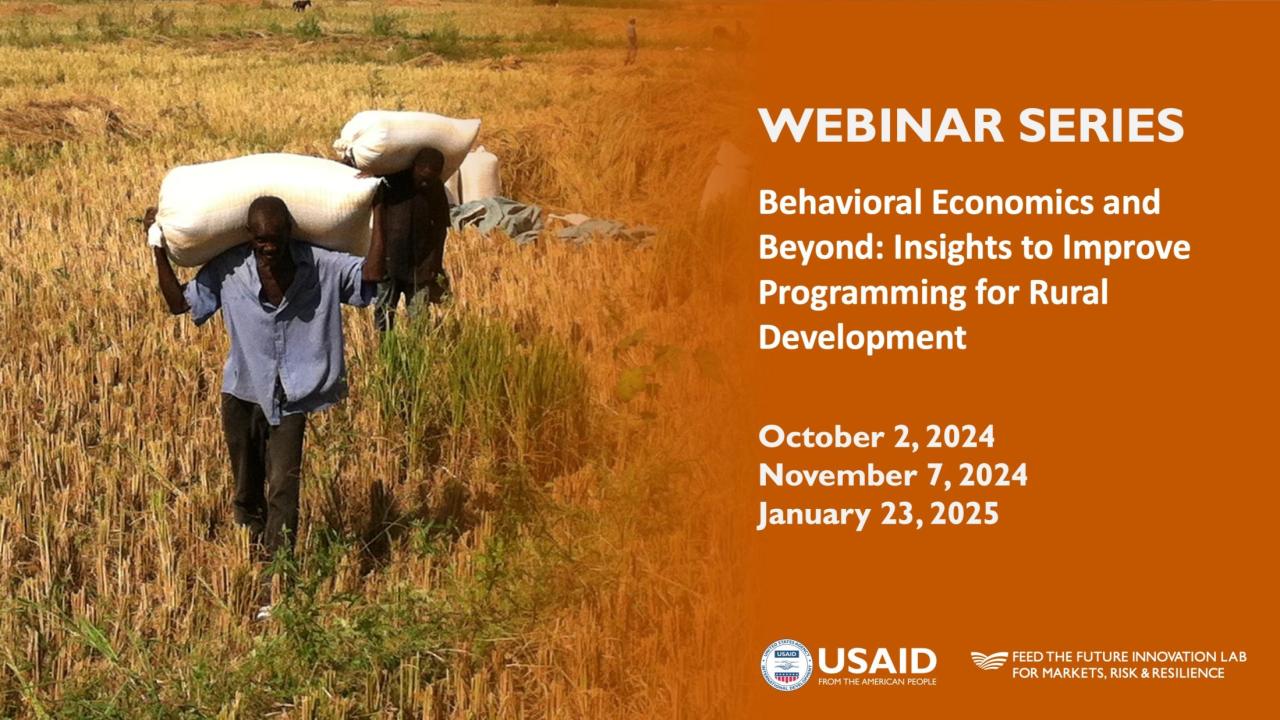
Event Date
Register for individual webinars below.
Behavioral Economics and Beyond:
Insights to Improve Programming for
Rural Development
The Feed the Future Innovation Lab for Markets, Risk and Resilience (MRR) hosted a Behavioral Economics Forum in February 2024 that delivered rigorous research examples of integrating behavioral economics in development programming. The focus of the two days was to share key evidence from advances in behavioral economics and illustrate how this evidence might be practically incorporated into interventions and policy for more effective development impacts. Takeaways are highlighted here.
Building out from the Forum, the MRR Innovation Lab is offering a series of three webinars to continue the conversation. We will be sharing a deeper understanding of what may drive behaviors in low-income rural areas; this includes considerations of behavioral economics, but also brings in several other important related factors, such as social networks and learning environments. The series will also foster connections between research and policy, and allow for discussion of how these findings may be applied in development programming.
Webinar Schedule
1. Psychological Poverty Traps – What are they and how do we escape?
October 2, 2024
10am EDT | 3pm WAT | 5pm EAT
Psychological well-being can play a determining role in people's economic lives. Psychological and economic assets need to be assessed together to fully understand how to build the resilience of people facing climate shocks or conflict. This session will highlight MRR-affiliated work that lays out what a psychological poverty trap looks like and how economic development interventions that robustly include behavioral insights can boost impacts.
(Slides available at the bottom of this page.)

Mo Alloush
Hamilton College

Michael Carter
University of California, Davis

Andrés Moya
Universidad de Los Andes
MRR-affiliated research:
- Moya, A., Carter, M. 2019. “Violence and the formation of hopelessness: Evidence from internally displaced persons in Colombia.” World Development.
- Zheng, G., Carter, M., Jensen, N., Krovetz, L. 2023. “Psychosocial Constraints, Impact Heterogeneity and Spillovers in a Multifaceted Graduation Program in Kenya.” NBER Working Paper 31611.
2. Enabling Tech Adoption Through Learning
November 7, 2024
10am EST | 4pm WAT | 6pm EAT
Smallholder farmers face information gaps that can hinder the uptake of new, productive technologies. Programs that intentionally spark learning, and recognize possible behavioral constraints to learning, will increase adoption of new agricultural technologies to close yield gaps and reduce poverty. This session highlights MRR-affiliated work that lays out evidence from creative “learning-focused” research projects that have generated benefits including higher crop yields and income.

Andrew Hobbs
University of
San Francisco

Jonathan Malacarne
University of Maine

Emilia Tjernström
Monash University
MRR-affiliated research:
- Boucher, S.R., Carter, M.R., Flatnes, J.E., Lybbert, T.J., Malacarne, J.G., Mareyna, P.P., Paul, L.A. 2024. "Bundling Genetic and Financial Technologies for More Resilient and Productive Small-Scale Farmers in Africa." The Economic Journal.
- Tjernström, E., Lybbert, T.J., Hernández, R.F., Correa, J.S. 2021. "Learning by (virtually) doing: Experimentation and belief updating in smallholder agriculture." Journal of Economic Behavior & Organization.
- MRR Innovation Lab. 2019. A Digital Game to Improve How Index Insurance Improves Resilience to Drought.
- Carter, M., Laajaj, R., Yang, D. 2021. "Subsidies and the African Green Revolution: Direct Effects and Social Network Spillovers of Randomized Input Subsidies in Mozambique." American Economic Journal: Applied Economics.
- Malacarne, J. 2024. "The farmer and the fates: Locus of control and investment in rainfed agriculture." Applied Economic Perspectives and Policy.
3. Inequality and Aspirations
Cancelled
The behavioral implications of social strata and ideas of fairness/equity are important to consider in economic development programming. Social networks, aspirations based off of an understanding of one's "place,” and one's sense of what is fair, can all impact how farmers make decisions about investing in their future. This session will focus on MRR-affiliated work that lays out evidence on the subtle behavioral effects of social strata, and how this knowledge can be incorporated into programming for better outcomes.

Richard A. Gallenstein
The Catholic University
of America

Sarah Janzen
University of Illinois
Urbana-Champaign

Bruce Wydick
University of San Francisco
Relevant research:
- Janzen, S., Magnan, N., Sharma, S., Thompson, W.M. 2017. "Aspirations failure and formation in rural Nepal." Journal of Economic Behavior & Organization.
- Gallenstein, R.A. 2024. "Does inequality impede risk management? Evidence from a lab experiment in Ghana." Journal of Risk and Insurance.
- Gallenstein, R.A. 2024. "Unearned Inequality and Biased Distributional Preferences: Evidence from a Lab Experiment in Ghana. The Journal of Development Studies
- Policy Brief (Gallenstein): Inequality Impacts Risk Sharing and Insurance Demand
- Rojas Valdes, R.I., Wydick, B, Lybbert, T.J. 2021. "Can hope elevate microfinance? Evidence from Oaxaca, Mexico." Oxford Economic Papers, 1-29.
- Ross, P.H., Glewwe, P., Prudencio, D., Wydick, B. 2021. "Developing educational and vocational aspirations through international child sponsorship: Evidence from Kenya, Indonesia, and Mexico. World Development, 140.
